Tourism, Tyranny, and the Taliban
The dark truth behind Afghanistan's rising rates of tourism
Historically, Afghanistan has been an attractive tourist destination for Europeans, Americans, our neighbors in Asia, and beyond. We have a little bit of everything: a mountainous countryside with trails winding through the Himalayan mountains that pierce through the tip of the northeast with rolling dunes of sand covering the southwest.
It's easy to see why visitors would embrace the opportunity to visit the country once more. What’s harder to understand is why a small group of foreign social media influencers are willing to whitewash the Taliban’s human rights violations and claim the country is safe, harmonious, and a haven for visitors once more.
In the past, many tourists were drawn to the east, where a gorgeous evergreen landscape yields fresh fruits and vegetables year-round. Others head for the historical Bamyan province, with its millennium-old Buddha statues and blue lakes, which lie at the nation's heart. The smaller cities of Parwan, Panjshir, Noristan, and Badakhshan are slightly north of Kabul—all with their unique topography and picturesque scenery. The country has something to offer anyone, no matter what kind of nature they prefer.
Watching old documentaries and movies about Afghanistan, you’ll see luxury resorts in these provinces and regions. These five-star resorts once hosted guests from all over the world who enjoyed bathing in the sun while sipping a cocktail by the pool. Scenes like this are unfamiliar to Afghans like me and are only confined to TV and computer screens.
During the 20 years of the US intervention in Afghanistan, the development that took place saw an increase in tourists once again after nearly 40 years of constant war. However, due to security issues due to the Taliban's underlying presence, many people grew increasingly hesitant about traveling to the country. The terror group’s active propagation of violence in resorts, hotels, restaurants, cafes, and lounges dissuaded many who were previously interested in the idea of touring Afghanistan. Despite these challenges, people still visited the country and were able to enjoy themselves, albeit with heavy protection and security measures.
On August 15th, 2021, when the Taliban took control of Afghanistan for the second time, they issued a national pardon and promised stability in the country. Unfortunately, the pardon only bought them time to infiltrate society at a deeper level and operate at their own pace—ultimately in order to single out individuals to be assassinated, imprisoned, tortured, and killed. Meanwhile, they banned women's education, work, entertainment, and even beauty salons. Afghan female protesters who took to the streets to revolt against the oppressive regime were beaten on the street, tortured, and, in some instances, sexually exploited and abused. Previous government employees with pension funds were now pensionless, while female workers were sent home and told to send male representatives to work in their place. Girls as young as 13 and 14 are now being forced into marriage to Taliban officials and soldiers across the country as their second, third, and sometimes even fourth wives. Restaurants no longer serve women; if they do, the women are segregated into a small, dedicated, isolated space away from sight. Taxi drivers could be beaten if they transport a girl who is not accompanied by her male guardian (husband, brother, or father). Widows face severe economic challenges and have no way to work and provide for their families. These women are often widowed thanks to the 20 years of the Taliban's suicide bombings, coordinated attacks, and war against the national army.
Despite all of this, over the past three years, we’ve seen a considerable spike in Taliban-backed social media influencers who are visiting Afghanistan and portraying the country as the “Turkey” of central Asia. It is deeply concerning that such channels can operate freely and actively on social media and YouTube, promoting the agenda of the Taliban while undermining and dismissing the 20 years of bloodshed, terror, and horror. Their furthering of the regime’s propaganda ignores the efforts of girls who protest against the education ban—while a privileged Scottish, Polish, or American tourist claims how safe the country has supposedly become. It’s heartbreaking to watch the Taliban propaganda machine transform the face of the country into a tourist destination while masking the cruelty of what happens in the country every day. In 2021, there were 691 foreign tourists. In 2022, that figure rose to 2,300. Last year, there were 7,000. Their propaganda is working. Rather than attend to the gross human rights abuses—particularly of women and girls—occurring across the country, Western tourists seemingly would prefer to boost their personal profiles and spread misinformation. The money they spend during their trips goes directly into the pockets of Taliban officials and does nothing to improve the economy. It simply continues to fuel the propaganda machine.
There are reports of the Taliban easing restrictions on particular districts in Kabul, such as Shar-e-now, Wazir Akbar Khan, Qala-i-Fatullah, and Kart-e-Char, because these areas are where national and international media, tourists, and visitors are most present. The Taliban use this tactic to showcase how “modern” and “progressive” they are when YouTubers and media cover such areas.
Youtubers like “Wandering Emma,” “Samantha Taylor,” “The Globetrotting Detective,” and “Lord Miles,” to name a few, are among the people I have witnessed either directly or indirectly supporting the Taliban through their content. These creators, some of whom had no previous content posted on their pages or any other travel history aside from Afghanistan or Pakistan, seem to come to the country with one agenda: promoting Taliban propaganda.
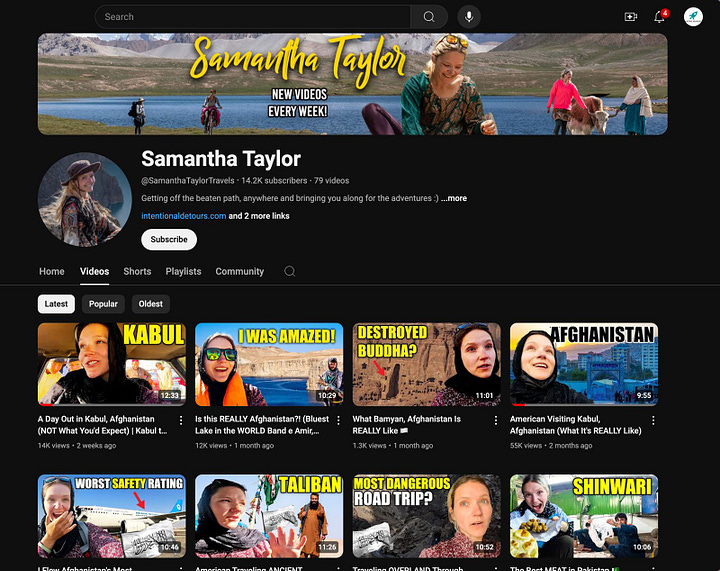
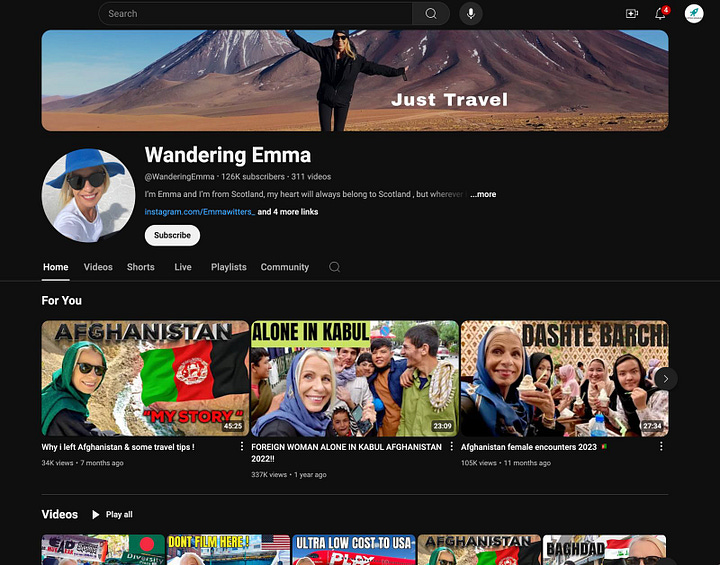
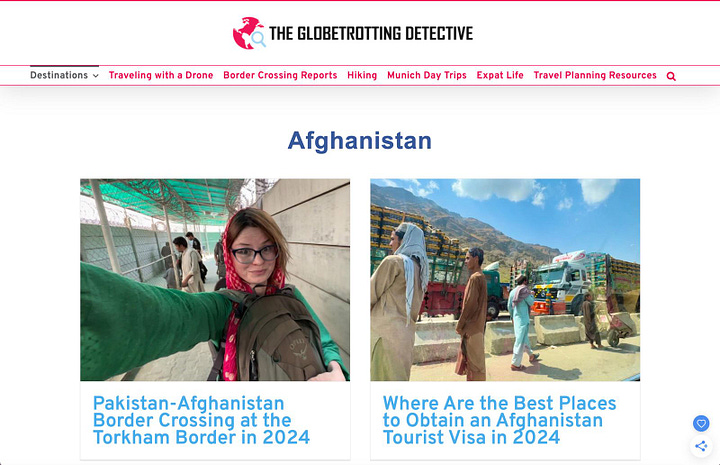

Lord Miles went as far as to bring merchandise from the Taliban back to the West to sell. Among the items sold in his shop are Taliban bandanas, Taliban flag pins, Taliban military pins, and headbands. One of his videos, with more than 217 thousand views, shows him visiting the Al-Qaeda cave network where Osama Bin Laden was located during his time in Afghanistan under the first Taliban regime. His first comment under the video reads, “Remember guys, I've restocked the Taliban flags. Pre-order them in the description! LIKE AND SUBSCRIBE TOO!” Each item is sold for somewhere between 18 and 36 pounds; some are so popular they have run out of stock. One of the most disturbing pieces Lord Miles sells is a 9/11 rug showing the horrific scenes of planes crashing into the Twin Towers in New York City. The estimated total value of the goods in Lord Miles’ shop amounts to around 22,819 Pounds or USD 29,725, excluding the sold-out items.
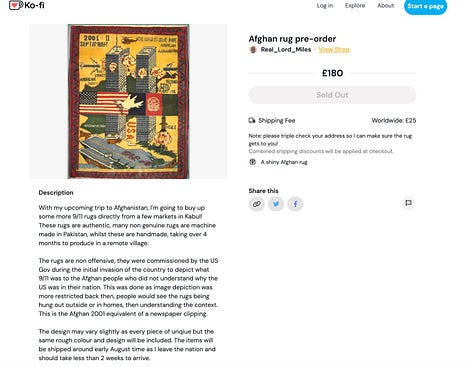
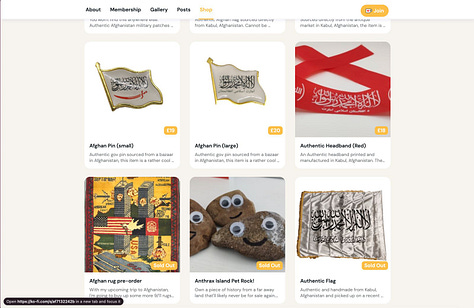
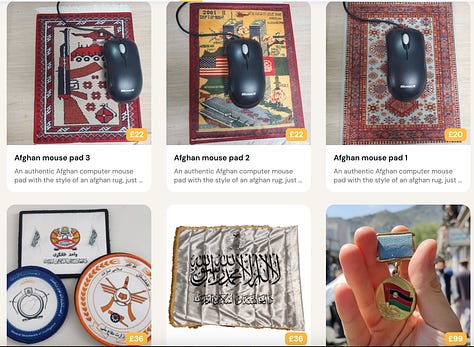
When asked how he feels about the Taliban’s ban on women and girls receiving an education, he said:
“It’s an Islamic country; it’s what I expect. If the Taliban come to England, they respect that it’s a Christian Catholic country, and when I come here, I respect the rules of how things are done. Even if I don’t agree, it’s understandable.”
These influencers are not only spreading Taliban misinformation—they are profiting off of the Afghan people’s suffering and making it harder than it already is for the truth to reach the outside world at a time when it is most needed. Sarah Baharaki, Global Youth Representative to the UN and an Afghan human rights activist who now lives in exile in London, told me:
“The recent trend of foreign YouTubers and influencers visiting Afghanistan and portraying a misleadingly positive image of the country, thereby diverting attention from ongoing human rights violations, is deeply concerning. While they are free to share their personal experiences as non-citizens, they must refrain from creating a distorted narrative that suggests normalcy and safety for all Afghans. Such depictions irresponsibly ignore the reality that women are being denied their basic human rights to education and work, imprisoned within their own homes, protesters are being detained, and the general public lives in fear.”
Ideas Beyond Borders, as an organization actively working in Afghanistan, is seeking to shed light on the reality of the situation. We work directly with people who have first-hand stories of the brutal truth, which is far from what the Taliban portray through Western influencers ignorant enough to buy into their lies. The Untold Stories of the Middle East presents powerful testimonies of individuals creating prosperous communities and thriving small businesses through the Innovation Hub. It also details Afghan women’s work running secret underground schools in defiance of the Taliban’s edicts. Those women are the brave ones—not the influencers.
The only way to tackle these propaganda disseminators is to fight back, continue talking to more people inside the country, and share as many stories out of the country as possible with the rest of the world. The Untold Stories of the Middle East honestly represents the reality Afghan people are facing under the Taliban regime, and even offers hope for the future. We need your support to further the cause. The truth matters—Afghan women and girls’ futures depend on it.
Middle East Uncovered is powered by Ideas Beyond Borders.





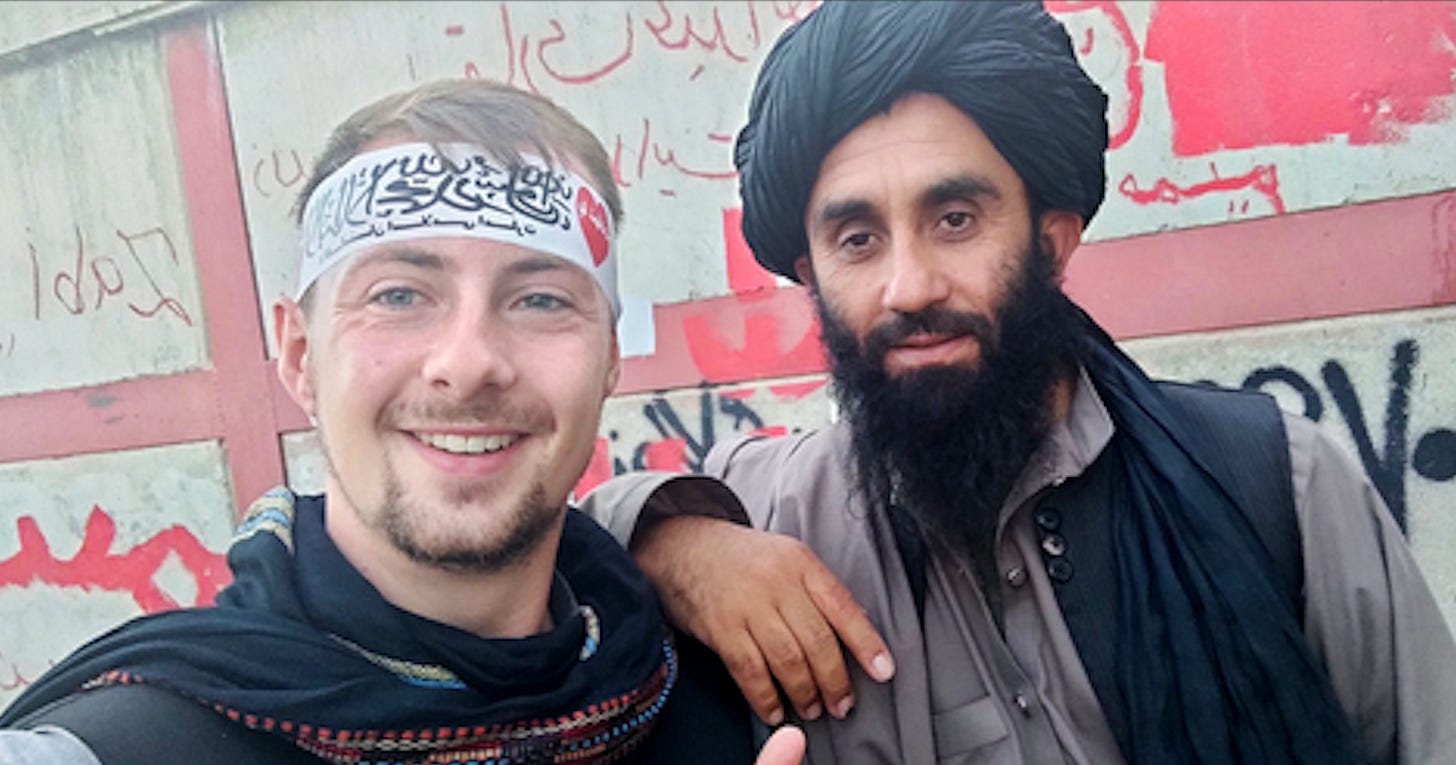
Really good point. The book Untold Stories of the Middle East, which shows positive initiatives in Afghanistan and elsewhere, is a must read.